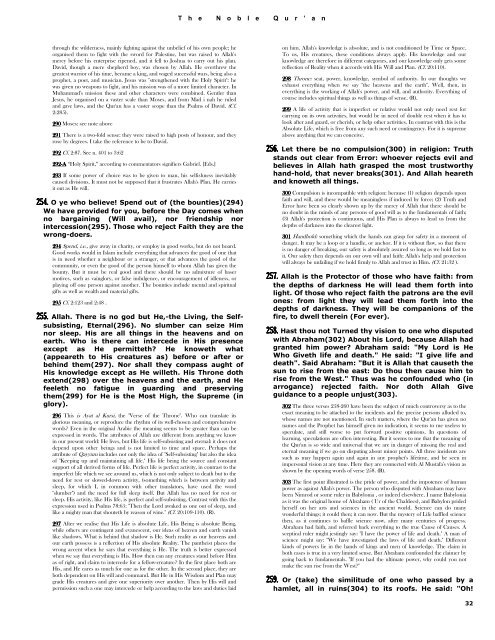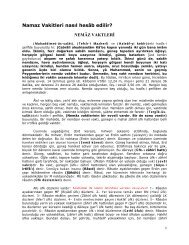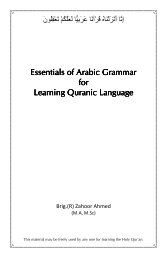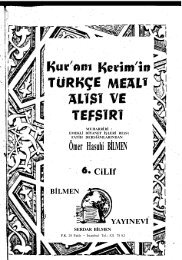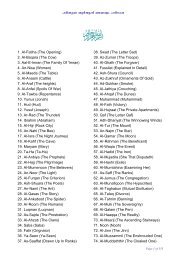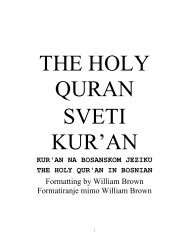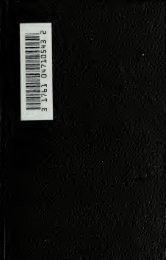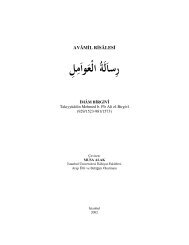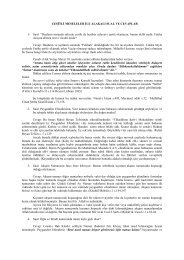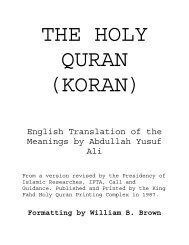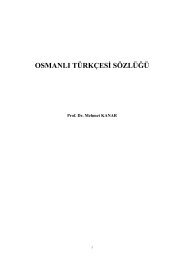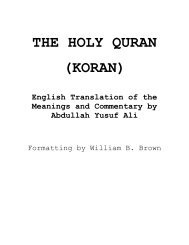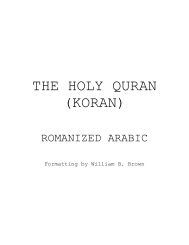English Quran with Commentaries By Yusuf-ali - HolyBooks.com
English Quran with Commentaries By Yusuf-ali - HolyBooks.com
English Quran with Commentaries By Yusuf-ali - HolyBooks.com
- No tags were found...
Create successful ePaper yourself
Turn your PDF publications into a flip-book with our unique Google optimized e-Paper software.
T h e N o b l e Q u r ’ a n<br />
through the wilderness, mainly fighting against the unbelief of his own people; he<br />
organised them to fight <strong>with</strong> the sword for Palestine, but was raised to Allah's<br />
mercy before his enterprise ripened, and it fell to Joshua to carry out his plan.<br />
David, though a mere shepherd boy, was chosen by Allah. He overthrew the<br />
greatest warrior of his time, became a king, and waged successful wars, being also a<br />
prophet, a poet, and musician. Jesus was "strengthened <strong>with</strong> the Holy Spirit": he<br />
was given no weapons to fight, and his mission was of a more limited character. In<br />
Muhammad's mission these and other characters were <strong>com</strong>bined. Gentler than<br />
Jesus, he organised on a vaster scale than Moses, and from Mad i nah he ruled<br />
and gave laws, and the Qur'an has a vaster scope than the Psalms of David. (Cf.<br />
2:285).<br />
290 Moses: see note above<br />
291 There is a two-fold sense: they were raised to high posts of honour, and they<br />
rose by degrees. I take the reference to be to David.<br />
292 Cf. 2:87. See n. 401 to 3:62<br />
292-A “Holy Spirit,” according to <strong>com</strong>mentators signifiers Gabriel. [Eds.]<br />
293 If some power of choice was to be given to man, his selfishness inevitably<br />
caused divisions. It must not be supposed that it frustrates Allah's Plan. He carries<br />
it out as He will.<br />
254. O ye who believe! Spend out of (the bounties)(294)<br />
We have provided for you, before the Day <strong>com</strong>es when<br />
no bargaining (Will avail), nor friendship nor<br />
intercession(295). Those who reject Faith they are the<br />
wrong-doers.<br />
294 Spend, i.e., give away in charity, or employ in good works, but do not hoard.<br />
Good works would in Islam include everything that advances the good of one that<br />
is in need whether a neighbour or a stranger, or that advances the good of the<br />
<strong>com</strong>munity, or even the good of the person himself to whom Allah has given the<br />
bounty. But it must be real good and there should be no admixture of baser<br />
motives, such as vainglory, or false indulgence, or encouragement of idleness, or<br />
playing off one person against another. The bounties include mental and spiritual<br />
gifts as well as wealth and material gifts.<br />
295 Cf. 2:123 and 2:48 .<br />
255. Allah. There is no god but He,-the Living, the Selfsubsisting,<br />
Eternal(296). No slumber can seize Him<br />
nor sleep. His are all things in the heavens and on<br />
earth. Who is there can intercede in His presence<br />
except as He permitteth? He knoweth what<br />
(appeareth to His creatures as) before or after or<br />
behind them(297). Nor shall they <strong>com</strong>pass aught of<br />
His knowledge except as He willeth. His Throne doth<br />
extend(298) over the heavens and the earth, and He<br />
feeleth no fatigue in guarding and preserving<br />
them(299) for He is the Most High, the Supreme (in<br />
glory).<br />
296 This is Ayat al Kursi, the "Verse of the Throne". Who can translate its<br />
glorious meaning, or reproduce the rhythm of its well-chosen and <strong>com</strong>prehensive<br />
words? Even in the original Arabic the meaning seems to be greater than can be<br />
expressed in words. The attributes of Allah are different from anything we know<br />
in our present world: He lives, but His life is self-subsisting and eternal: it does not<br />
depend upon other beings and is not limited to time and space. Perhaps the<br />
attribute of Qayyum includes not only the idea of "Self-subsisting" but also the idea<br />
of "Keeping up and maintaining all life." His life being the source and constant<br />
support of all derived forms of life. Perfect life is perfect activity, in contrast to the<br />
imperfect life which we see around us, which is not only subject to death but to the<br />
need for rest or slowed-down activity, (something which is between activity and<br />
sleep, for which I, in <strong>com</strong>mon <strong>with</strong> other translators, have used the word<br />
"slumber") and the need for full sleep itself. But Allah has no need for rest or<br />
sleep. His activity, like His life, is perfect and self-subsisting. Contrast <strong>with</strong> this the<br />
expression used in Psalms 78:65: "Then the Lord awaked as one out of sleep, and<br />
like a mighty man that shouteth by reason of wine." (Cf. 20:109-110). (R).<br />
297 After we re<strong>ali</strong>se that His Life is absolute Life, His Being is absolute Being,<br />
while others are contingent and evanescent, our ideas of heaven and earth vanish<br />
like shadows. What is behind that shadow is He. Such re<strong>ali</strong>ty as our heavens and<br />
our earth possess is a reflection of His absolute Re<strong>ali</strong>ty. The pantheist places the<br />
wrong accent when he says that everything is He. The truth is better expressed<br />
when we say that everything is His. How then can any creatures stand before Him<br />
as of right, and claim to intercede for a fellow-creature? In the first place both are<br />
His, and He cares as much for one as for the other. In the second place, they are<br />
both dependent on His will and <strong>com</strong>mand. But He in His Wisdom and Plan may<br />
grade His creatures and give one superiority over another. Then by His will and<br />
permission such a one may intercede or help according to the laws and duties laid<br />
on him. Allah's knowledge is absolute, and is not conditioned by Time or Space.<br />
To us, His creatures, these conditions always apply. His knowledge and our<br />
knowledge are therefore in different categories, and our knowledge only gets some<br />
reflection of Re<strong>ali</strong>ty when it accords <strong>with</strong> His Will and Plan. (Cf. 20:110).<br />
298 Throne: seat, power, knowledge, symbol of authority. In our thoughts we<br />
exhaust everything when we say "the heavens and the earth". Well, then, in<br />
everything is the working of Allah's power, and will, and authority. Everything of<br />
course includes spiritual things as well as things of sense. (R).<br />
299 A life of activity that is imperfect or relative would not only need rest for<br />
carrying on its own activities, but would be in need of double rest when it has to<br />
look after and guard, or cherish, or help other activities. In contrast <strong>with</strong> this is the<br />
Absolute Life, which is free from any such need or contingency. For it is supreme<br />
above anything that we can conceive.<br />
256. Let there be no <strong>com</strong>pulsion(300) in religion: Truth<br />
stands out clear from Error: whoever rejects evil and<br />
believes in Allah hath grasped the most trustworthy<br />
hand-hold, that never breaks(301). And Allah heareth<br />
and knoweth all things.<br />
300 Compulsion is in<strong>com</strong>patible <strong>with</strong> religion: because (1) religion depends upon<br />
faith and will, and these would be meaningless if induced by force; (2) Truth and<br />
Error have been so clearly shown up by the mercy of Allah that there should be<br />
no doubt in the minds of any persons of good will as to the fundamentals of faith;<br />
(3) Allah's protection is continuous, and His Plan is always to lead us from the<br />
depths of darkness into the clearest light.<br />
301 Handhold: something which the hands can grasp for safety in a moment of<br />
danger. It may be a loop or a handle, or anchor. If it is <strong>with</strong>out flaw, so that there<br />
is no danger of breaking, our safety is absolutely assured so long as we hold fast to<br />
it. Our safety then depends on our own will and faith: Allah's help and protection<br />
will always be unfailing if we hold firmly to Allah and trust in Him. (Cf. 21:32 ).<br />
257. Allah is the Protector of those who have faith: from<br />
the depths of darkness He will lead them forth into<br />
light. Of those who reject faith the patrons are the evil<br />
ones: from light they will lead them forth into the<br />
depths of darkness. They will be <strong>com</strong>panions of the<br />
fire, to dwell therein (For ever).<br />
258. Hast thou not Turned thy vision to one who disputed<br />
<strong>with</strong> Abraham(302) About his Lord, because Allah had<br />
granted him power? Abraham said: "My Lord is He<br />
Who Giveth life and death." He said: "I give life and<br />
death". Said Abraham: "But it is Allah that causeth the<br />
sun to rise from the east: Do thou then cause him to<br />
rise from the West." Thus was he confounded who (in<br />
arrogance) rejected faith. Nor doth Allah Give<br />
guidance to a people unjust(303).<br />
302 The three verses 258-260 have been the subject of much controversy as to the<br />
exact meaning to be attached to the incidents and the precise persons alluded to,<br />
whose names are not mentioned. In such matters, where the Qur'an has given no<br />
names and the Prophet has himself given no indication, it seems to me useless to<br />
speculate, and still worse to put forward positive opinions. In questions of<br />
learning, speculations are often interesting. But it seems to me that the meaning of<br />
the Qur'an is so wide and universal that we are in danger of missing the real and<br />
eternal meaning if we go on disputing about minor points. All three incidents are<br />
such as may happen again and again in any prophet's lifetime, and be seen in<br />
impersonal vision at any time. Here they are connected <strong>with</strong> Al Mustafa's vision as<br />
shown by the opening words of verse 258. (R).<br />
303 The first point illustrated is the pride of power, and the impotence of human<br />
power as against Allah's power. The person who disputed <strong>with</strong> Abraham may have<br />
been Nimrod or some ruler in Babylonia , or indeed elsewhere. I name Babylonia<br />
as it was the original home of Abraham ( Ur of the Chaldees), and Babylon prided<br />
herself on her arts and sciences in the ancient world. Science can do many<br />
wonderful things; it could then; it can now. But the mystery of Life baffled science<br />
then, as it continues to baffle science now, after many centuries of progress.<br />
Abraham had faith, and referred back everything to the true Cause of Causes. A<br />
sceptical ruler might jestingly say: "I have the power of life and death." A man of<br />
science might say: "We have investigated the laws of life and death." Different<br />
kinds of powers lie in the hands of kings and men of knowledge. The claim in<br />
both cases is true in a very limited sense. But Abraham confounded the claimer by<br />
going back to fundamentals. "If you had the ultimate power, why could you not<br />
make the sun rise from the West?"<br />
259. Or (take) the similitude of one who passed by a<br />
hamlet, all in ruins(304) to its roofs. He said: "Oh!<br />
32


